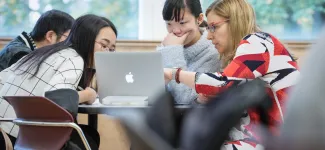Having relocated from Ireland to take up her position as a Geography Instructor at UBC Vantage College in Vancouver, Siobhán McPhee is crafting an experiential approach to teaching her students, and experimenting with geolocation-aware technology in the process.
How long have you been working in UBC Vantage College and what motivated you to join?I’ve been at Vantage since July 2013, when the program was still in its infancy.
The cross-appointment advertisement for the position was emailed to me by an academic friend in the US, who said she thought it was written just for me, given I have a background in English language teaching in the Middle East, Asia and Ireland, as well as my Economic Geography graduate studies and research.
The premise of a content-embedded language program was incredibly exciting for me as I always struggled with the idea of language teaching in an abstract manner. Additionally, I have incredible respect for the work of colleagues within UBC's Department of Geography, so it seemed like a win-win for me! Vancouver seemed very far way from all I knew in Ireland, but I am an explorer (and a geographer) so embraced the opportunity for something and somewhere new.
One of the fundamental pedagogical approaches that I embed in all my teaching is that of aiming to provide students with as much experiential learning opportunities as possible. My pedagogical approach is coupled with the discipline of Geography’s desire to engage students in field work as part of their courses. This is not always possible in large undergraduate classes, but then experiential learning or ‘field work’ does not necessarily need to be in a remote far off location, or indeed even outside the classroom.
Each week, in the third and final hour of my lecture, I ask students to form groups of four, then work together on a worksheet to answer questions based on online case studies provided to them through the Educational Management System (Canvas at present). The case studies are based on the weekly theme focus (‘colonialism’ for example), and include online articles, images or short videos. Students are transported to places and times highlighted throughout the lecture, then are asked to engage critically with the content.
I immensely disliked being a passive learner during my schooling and university education, so I sought any opportunity to try to bring to life what I was studying by asking for examples or by reading beyond my prescribed material. Hence, I strive to design my curriculum in a manner where students cannot simply drift along in my courses, but actually have to apply what they are learning. Of course some resist at first but I find that in reflecting at the end of term, they really appreciate being challenged to be present.
The added group work piece is an attempt to create ‘real world’ experiences, acknowledging that upon graduation students will more often than not be working in teams or collaborating with others.
I’m always amazed every week by the transformation of the room. For the first two hours there are usually only a few voices offering questions and thoughts, but once the worksheet online case study component begins in the third hour, the room comes alive with chatter. I love hearing students say, “You want my thoughts on this? You care what I think about that?”; I can see how it empowers them and gets them to think beyond the words on the screen or in their readings.
What challenges have you encountered with experiential teaching?There is always resistance at the start of term when it comes to group work and students realise that their individual grade is impacted by the rest of their group members. However, when peer pressure is positively used, it can be incredibly powerful! Another challenge at first is having students take in the material they are engaging with, but then offer their own interpretation or thoughts. The only way forward with this challenge of critical engagement is to keep having them do it, so every week we practice these skills.
What will you be focusing on this academic year at Vantage College?I continue to learn from my Vantage students and colleagues on a daily basis. My focus this year is not on trying to cover the entire world or theme in a lecture or even in a course, but to focus on developing my students’ skills and engagement.
My motto for this academic year has been ‘less is more’ and I am enjoying the slight modifications I have made so far.
The Vantage program has also enabled me to develop my use of educational technologies in my pedagogical approaches to experiential learning. I plan to continue to work on this to provide my students with the best opportunities to experience what they are learning and to provide them with the language and skills support that I am capable of.
My approach to developing field experiences beyond the classroom using a geolocation-aware technology has enabled me to engage beyond Vantage [to find out more, click here].
Faculty at the UBC Faculty of Land and Food Systems and UBC First Nations Studies department are now actively using the framework I have developed with their students. This specific approach to experiential learning has also enabled me to engage with UBC Studios and the Emerging Media Lab, where I have the opportunity to work with colleagues and students from across campus.
Collaboration with faculty from across campus that I would otherwise never have had the opportunity to do so.
Working with bright students from across the globe and watching them grow and blossom as young scholars - my first cohort of Vantage students are grading this year!
Being facilitated with incredible opportunities to be a leader in the Educational Leadership stream, a reality that I know is not always easy for our stream within their departments.
